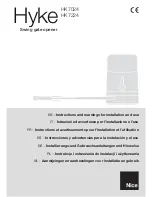
EN
12
– English
DISPOSING OF THE PRODUCT
This product is an integral part of the automation system, and should
therefore be disposed of together with it.
As for the installation operations, even at the end of this product’s life span, the
dismantling operations must be carried out by qualified experts.
This product is made up of various types of materials: some can be recycled
while others need to be disposed of. Find out about the recycling or disposal
systems envisaged by your local regulations for this product category.
Important!
– Parts of the product could contain pollutants or hazardous sub-
stances which, if released into the environment, could cause harmful effects to
the environment itself as well as to human health.
As indicated by the symbol opposite, throwing away this prod-
uct as domestic waste is strictly forbidden. So dispose of it as
differentiated waste, in accordance with your local regulations,
or return the product to the retailer when you purchase a new
equivalent product.
Important!
– the local applicable regulations may envisage
heavy sanctions in the event of illegal disposal of this product.
Disposal of the back-up battery (where present)
Important!
– The flat battery contains pollutants and should therefore not be
thrown away as common waste.
It should be disposed of as differentiated waste, as envisaged by your local
applicable regulations.
Product lifetime
The lifetime is the average economic duration of the product. The value of life-
time is strongly influenced by the intensity of the manoeuvres performed by the
automation. i.e. the sum of all factors that contribute to product wear (see
Table 13).
To establish the probable lifetime of your automation, proceed as follows:
01.
Calculate the severity index by adding all percentages of the items specified
in
Table 13
;
02.
In
Graph 3
from the value obtained above, trace vertical line until it inter-
sects the curve; from this point trace a horizontal line until it intersects the line
of the “manoeuvre cycles”. The value obtained is the estimated lifetime of your
product.
The estimation of lifetime is made on the basis of design calculations and the
results of tests performed on prototypes. As it is only an estimation, it does not
represent any form of guarantee on the effective lifetime of the product.
Example of calculating the lifetime of a HYKE gearmotor with LONG length arm
(refer to Table 13 and Graph 3):
- leaf length = 2,8 m (severity index: 20%); - leaf weight: 230 Kg m (severity index: 20%); -
solid leaf (severity index: 15%); Total severity index = 55%; Estimated lifetime = 220.000
manoeuvre cycles
100.000
0
10 20
30 40
50
60
70 80
90 100
200.000
300.000
400.000
500.000
220.000
GRAPH 3
manoeuvr
e cycles
strenuousness index %
PRODUCT MAINTENANCE
9
In order to keep the safety level constant and to guarantee the maximum life
span of the entire automation system, regular maintenance is vital.
All maintenance work must be carried out in compliance with the safety provi-
sions of this manual and in accordance with existing laws and regulations.
The product requires frequent inspection to check for imbalances of the doors
or signs of wear or damage to the cables. Do not use the product if adjust-
ments or repairs are required.
Important
– During the product maintenance or cleaning operations, cut
off the electricity supply to the control unit and any batteries envisaged.
For the other devices in the system, follow the instructions provided in their
respective maintenance schedules.
For gearmotors HK7024, HK7224, scheduled maintenance is required at the
latest 6 months or 20,000 manoeuvres after the previous maintenance work.
Maintenance can be performed as follows:
01.
Cut off any electrical power source, including any back-up batteries;
02.
Check the condition and wear of brackets and fixing plugs, paying special
attention to erosion or rusting; replace all parts which do not provide suffi-
cient guarantees;
03.
Perform a trial release to ensure it is working properly – see paragraph 3.6.
04.
Reconnect the electrical power sources and perform all the checks envis-
aged in chapter 5 - Testing.
TABLE 13
Severity index
LONG length arm
SHORT length arm
< 1,8
1,8 - 2,5 m
2,5 - 3 m
3 - 3,5 m
< 200 kg
200 + 250 kg
> 250 kg
Leaf length
Leaf weight
Ambient temperature above 40°C or below 0°C
or humidity over 80%
Solid leaf
Installation in windy zone
Note – The data refer to a balanced sectional door in perfect maintenance conditions
0%
15%
20%
30%
0%
20%
30%
20%
15%
15%
15%
20%
30%
-
30%
40%
-
20%
20%
20%
Summary of Contents for HK7024
Page 2: ......
Page 25: ...IX 1 2 3 4 320 mm 210 mm 290 mm ...
Page 27: ...XI 1 2 a b 3 9 5 OK OK b a 9 b a a b x 4 c a 4 1 2 3 4 90 90 10 7 6 8 ...
Page 28: ...XII 9 1 2 a b 3 10 5 b x 4 c a 4 8 b a 10 1 2 3 13 11 6 OK OK 7 ...
Page 29: ...XIII 1 2 90 3 90 12 A 90 2 1 3 12 B 4 OK 3 NO 2 NO 11 1 3 2 5 4 ...
Page 31: ...6 1 2 8 7 15 1 3 5 1 2 2 4 XV ...
Page 32: ...XVI 16 1 2 7 6 17 L1 OPEN STOP CLOSE L2 L3 L4 L5 L6 L7 L8 ...
Page 33: ...XVII 1 2 1 2 18 1 3 5 1 2 2 2 1 4 19 1 2 ...
Page 34: ...XVIII 1 2 20 1 4 1 2 3 2 ...















































